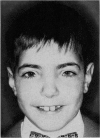Abstract
Waardenburg's syndrome consists of lateral displacement of the inner canthi of the eyes (dystopia canthorum), a broad nasal root and confluent eyebrows, heterochromia iridum, a white forelock and congenital deafness. The syndrome is inherited as a dominant, but affected individuals do not necessarily have all of the characteristics cited.
Five hundred and fourteen pupils at a school for the deaf were screened for features of this syndrome. Three cases were discovered. Eleven other deaf children were found to have heterochromia iridum and two more had white forelocks. The interocular dimensions of the remaining children were recorded as standards by which to judge the presence of dystopia canthorum. The results of chromosomal analysis in two cases with Waardenburg's syndrome were normal.
The findings provide further evidence that Waardenburg's syndrome is a distinct entity and call in question Mackenzie's concept of a comprehensive “first arch syndrome”.
Full text
PDF









Images in this article
Selected References
These references are in PubMed. This may not be the complete list of references from this article.
- BAKER J. B. The effects of drugs on the foetus. Pharmacol Rev. 1960 Mar;12:37–90. [PubMed] [Google Scholar]
- CALINIKOS J. Waardenburg's syndrome. J Laryngol Otol. 1963 Jan;77:59–62. doi: 10.1017/s0022215100060369. [DOI] [PubMed] [Google Scholar]
- CAMPBELL B., CAMPBELL N. R., SWIFTS Waardenbrug's syndrome. A variation of the first arch syndrome. Arch Dermatol. 1962 Dec;86:718–724. doi: 10.1001/archderm.1962.01590120016003. [DOI] [PubMed] [Google Scholar]
- DIGEORGE A. M., OLMSTED R. W., HARLEY R. D. Waardenburg's syndrome. A syndrome of heterochromia of the irides, lateral displacement of the medial canthi and lacrimal puncta, congenital deafness, and other characteristic associated defects. J Pediatr. 1960 Nov;57:649–669. doi: 10.1016/s0022-3476(60)80159-x. [DOI] [PubMed] [Google Scholar]
- FISCH L. Deafness as part of an hereditary syndrome. J Laryngol Otol. 1959 Jun;73:355–382. doi: 10.1017/s0022215100055420. [DOI] [PubMed] [Google Scholar]
- McKENZIE J. The first arch syndrome. Arch Dis Child. 1958 Oct;33(171):477–486. doi: 10.1136/adc.33.171.477. [DOI] [PMC free article] [PubMed] [Google Scholar]
- WAARDENBURG P. J. A new syndrome combining developmental anomalies of the eyelids, eyebrows and nose root with pigmentary defects of the iris and head hair and with congenital deafness. Am J Hum Genet. 1951 Sep;3(3):195–253. [PMC free article] [PubMed] [Google Scholar]
- WILDERVANCK L. S. Doofstomme kinderen met het syndroom van Waardenburg-Klein. Ned Tijdschr Geneeskd. 1957 Jun 15;101(24):1120–1121. [PubMed] [Google Scholar]
- ZELIG S. Syndrome of Waardenburg with deafness. Laryngoscope. 1961 Jan;71:19–23. doi: 10.1288/00005537-196101000-00002. [DOI] [PubMed] [Google Scholar]





